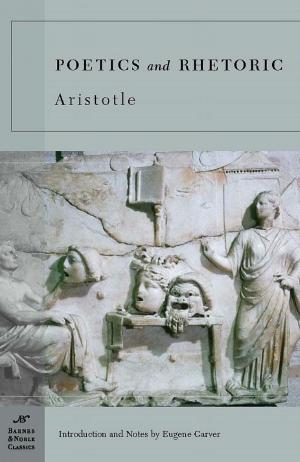Essential Dialogues of Plato (Barnes & Noble Classics Series)
Nonfiction, Religion & Spirituality, Philosophy| Author: | Plato, Pedro De Blas | ISBN: | 9781411432130 |
| Publisher: | Barnes & Noble Classics | Publication: | June 1, 2009 |
| Imprint: | Barnes & Noble Classics | Language: | English |
| Author: | Plato, Pedro De Blas |
| ISBN: | 9781411432130 |
| Publisher: | Barnes & Noble Classics |
| Publication: | June 1, 2009 |
| Imprint: | Barnes & Noble Classics |
| Language: | English |
Essential Dialogues of Plato, by Plato, is part of the Barnes & Noble Classics* *series, which offers quality editions at affordable prices to the student and the general reader, including new scholarship, thoughtful design, and pages of carefully crafted extras. Here are some of the remarkable features of Barnes & Noble Classics:
- New introductions commissioned from today's top writers and scholars
- Biographies of the authors
- Chronologies of contemporary historical, biographical, and cultural events
- Footnotes and endnotes
- Selective discussions of imitations, parodies, poems, books, plays, paintings, operas, statuary, and films inspired by the work
- Comments by other famous authors
- Study questions to challenge the reader's viewpoints and expectations
- Bibliographies for further reading
- Indices & Glossaries, when appropriate
All editions are beautifully designed and are printed to superior specifications; some include illustrations of historical interest. Barnes & Noble Classics pulls together a constellation of influences—biographical, historical, and literary—to enrich each reader's understanding of these enduring works.
Plato is one of those world-famed individuals, his philosophy one of those world-renowned creations, whose influence, as regards the culture and development of the mind, has from its commencement down to the present time been all-important.
— G. W. F. Hegel
Western philosophy starts with Socrates and his student Plato. By way of the dialectic that evolved between master and student, Plato invented the philosophical method of inquiry and analysis, and became the first to use a logical framework to ask—and try to answer—the eternal questions about ethics, politics, art, and life that still haunt humanity: What is virtue? What is justice? What is the ideal form of government? What is the individual’s relationship to the state? Do artists have a responsibility to society, or only to their own creative impulse? Plato explores these issues through a series of dialogues, records of supposed conversations between Socrates and other Greek aristocrats. Although Socrates is nominally the main speaker in all of them, only the earlier dialogues document his thoughts, while the latter ones present Plato’s own ideas.
What is often ignored in commentaries on Plato’s work is its unique literary form. The dialogues are neither dramas, nor stories, yet they are skillfully fashioned by means of characters, narrative events, dramatic moments, and perhaps most surprising, a great deal of humor. Along with such exemplars of Plato’s thought as Symposium, Apology, and Phaedrus, this volume includes the first three books of Plato’s Laws.
Pedro De Blas holds degrees in Law and Classics. He has worked as counsel for several international organizations, including the United Nations and the World Bank, and he is currently a Ph.D. candidate in Classics at Columbia University. He has taught classical languages and literature at Columbia, the CUNY Latin and Greek Institute, and New York University’s Gallatin School.
Essential Dialogues of Plato, by Plato, is part of the Barnes & Noble Classics* *series, which offers quality editions at affordable prices to the student and the general reader, including new scholarship, thoughtful design, and pages of carefully crafted extras. Here are some of the remarkable features of Barnes & Noble Classics:
- New introductions commissioned from today's top writers and scholars
- Biographies of the authors
- Chronologies of contemporary historical, biographical, and cultural events
- Footnotes and endnotes
- Selective discussions of imitations, parodies, poems, books, plays, paintings, operas, statuary, and films inspired by the work
- Comments by other famous authors
- Study questions to challenge the reader's viewpoints and expectations
- Bibliographies for further reading
- Indices & Glossaries, when appropriate
All editions are beautifully designed and are printed to superior specifications; some include illustrations of historical interest. Barnes & Noble Classics pulls together a constellation of influences—biographical, historical, and literary—to enrich each reader's understanding of these enduring works.
Plato is one of those world-famed individuals, his philosophy one of those world-renowned creations, whose influence, as regards the culture and development of the mind, has from its commencement down to the present time been all-important.
— G. W. F. Hegel
Western philosophy starts with Socrates and his student Plato. By way of the dialectic that evolved between master and student, Plato invented the philosophical method of inquiry and analysis, and became the first to use a logical framework to ask—and try to answer—the eternal questions about ethics, politics, art, and life that still haunt humanity: What is virtue? What is justice? What is the ideal form of government? What is the individual’s relationship to the state? Do artists have a responsibility to society, or only to their own creative impulse? Plato explores these issues through a series of dialogues, records of supposed conversations between Socrates and other Greek aristocrats. Although Socrates is nominally the main speaker in all of them, only the earlier dialogues document his thoughts, while the latter ones present Plato’s own ideas.
What is often ignored in commentaries on Plato’s work is its unique literary form. The dialogues are neither dramas, nor stories, yet they are skillfully fashioned by means of characters, narrative events, dramatic moments, and perhaps most surprising, a great deal of humor. Along with such exemplars of Plato’s thought as Symposium, Apology, and Phaedrus, this volume includes the first three books of Plato’s Laws.
Pedro De Blas holds degrees in Law and Classics. He has worked as counsel for several international organizations, including the United Nations and the World Bank, and he is currently a Ph.D. candidate in Classics at Columbia University. He has taught classical languages and literature at Columbia, the CUNY Latin and Greek Institute, and New York University’s Gallatin School.















